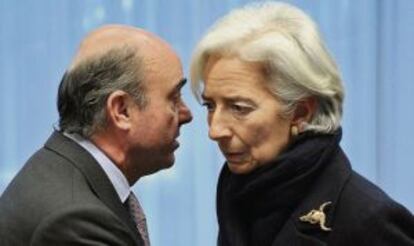Spanish GDP will not return to pre-crisis levels until 2017, says IMF
Organization warns against complacency and says more reforms are needed to create jobs

Spain will not recover its pre-crisis gross domestic product (GDP) levels until 2017, according to the International Monetary Fund (IMF).
The forecast means it will be one of the slowest euro-zone countries to bounce back from the prolonged slump – only Portugal, Slovenia, Finland, Italy and Greece will take longer to get back to the point they were at when the Great Recession hit.
Since 2008, Spanish GDP has retreated more than seven percentage points in a double recession
For Spain, the blow came in 2008, when the real estate bubble burst and its effects spread to the whole of the economy. However, the contagion was slow enough to make the Socialist government at the time claim that it was just an economic slowdown, rather than a full-fledged crisis.
Since then, Spanish GDP has retreated more than seven percentage points in a double recession.
But output has picked up in recent months again. Last year, the Spanish economy grew 1.4 percent and this year the IMF is forecasting 2.5 percent growth, while the Bank of Spain is talking about 2.8 percent.
Sources at the IMF admitted that they were being prudent with their predictions, and that they also want to send a message to the current Spanish government, as well as to the one that will emerge out of this fall’s elections.

The message is this: that the current growth formula is not enough, that the reforms necessary for sustainable growth are not over, and that the 2015 growth figures may not necessarily continue in the future.
While a surge in domestic demand and a stimulus package from the European Central Bank (ECB) have helped push the 2015 forecast up to 2.5 percent, the IMF’s predictions for Spain in 2016 go down to 2 percent, while in 2017 and 2020 these figures decrease even further to 1.7 percent and 1.8 percent.
“Complacency would be really bad, that would be the reason for not seeing an explosion in growth in the coming years. Any person who looks at unemployment figures will realize that complacency cannot be allowed,” said a source familiar with the IMF’s work.
In 2020, Spain’s unemployment rate is still expected to be above 20 percent, comparable only to that of Greece.
The IMF and the ECB want Spain to implement more labor reforms and try new formulas to resolve the job situation. The Washington-based organization is also surprised at Spanish firms’ low productivity compared with other euro-zone countries.
But although nobody will come out and say it in public, the IMF is not expecting the current Popular Party (PP) administration to effect any major changes in the months remaining before Spain holds general elections.
In the meantime, the Mariano Rajoy administration is taking credit for the recent improvements. “The contrast in growth is the result of this government’s economic policies. Spain is now a role model,” said Economy Minister Luis de Guindos at a recent press conference.
Tu suscripción se está usando en otro dispositivo
¿Quieres añadir otro usuario a tu suscripción?
Si continúas leyendo en este dispositivo, no se podrá leer en el otro.
FlechaTu suscripción se está usando en otro dispositivo y solo puedes acceder a EL PAÍS desde un dispositivo a la vez.
Si quieres compartir tu cuenta, cambia tu suscripción a la modalidad Premium, así podrás añadir otro usuario. Cada uno accederá con su propia cuenta de email, lo que os permitirá personalizar vuestra experiencia en EL PAÍS.
¿Tienes una suscripción de empresa? Accede aquí para contratar más cuentas.
En el caso de no saber quién está usando tu cuenta, te recomendamos cambiar tu contraseña aquí.
Si decides continuar compartiendo tu cuenta, este mensaje se mostrará en tu dispositivo y en el de la otra persona que está usando tu cuenta de forma indefinida, afectando a tu experiencia de lectura. Puedes consultar aquí los términos y condiciones de la suscripción digital.









































